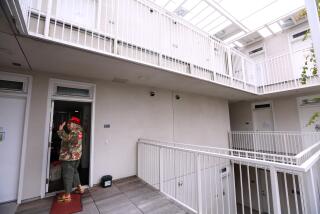Smaller Arts Center May Rise From Ashes of ‘C’
Supporters of a Thousand Oaks cultural center, deflated by their defeat in a city ballot question, nevertheless predicted Wednesday that a scaled-down version of the $22.3-million center will eventually be built.
Opponents of the ambitious cultural-center plan said that they, indeed, might support construction of a theater smaller than the proposed 1,800-seat centerpiece of Measure C, the advisory issue on new performing arts facilities.
But city officials who endorsed the measure called the grand plan for an arts complex finished for the time being.
“It’s definitely dead for this year and until there’s a strong showing to reactivate it,” said Mayor Alex T. Fiore, an ardent supporter of the center. “I was awfully surprised.”
20,847 Votes Cast
Measure C was rejected with a 54% ‘no’ vote Tuesday, when only 38.8% of the registered voters in Thousand Oaks turned out for a primary election, uncertified final returns showed. Ventura County elections officials said 20,847 ballots were cast on Measure C.
Measure C called for city redevelopment funds to be used to build two theaters, an art gallery and an amphitheater, and to help build three high-school theaters in the Conejo Valley.
Two groups of community activists who opposed the arts center greeted the returns with elation, saying it showed voters’ uneasiness at the prospect of spending millions on the arts.
“Our greatest strength lay in bringing out the financial issues. It’s public money, and they didn’t want to spend it,” said Richard D. Booker, a housing contractor and president of the Thousand Oaks Taxpayers Assn.
‘We’ll Be Ready
“If they push it again, we’ll be ready,” warned Jack Rudd, president of the Committee Against Tax-Supported Culture.
The proposal aroused coalitions of voters worried about the arts plan on a number of counts, both sides agreed.
Critics expressed not only philosophical antagonism to putting public funds into the arts, but opposition to the way the funds would be raised in this case--with property taxes collected over 40 years in a redevelopment district along Thousand Oaks Boulevard. Property taxes are funneled into the city’s redevelopment agency from new development within the district.
Although never considered a poverty-stricken strip, the boulevard was declared “blighted” for redevelopment purposes, prompting an investigation by the Ventura County district attorney’s office and the wrath of those who felt the action unfairly claimed property taxes for the city.
Critics Kept Fighting
Critics of the redevelopment agency carried on their fight against the cultural center.
Voters also were made uneasy by other pocketbook issues, such as whether the center’s expected yearly deficits would overwhelm private donations and what the project’s eventual cost would be, Booker said.
Besides, residents near the proposed sites for the center in central Thousand Oaks--Los Robles Golf Course and The Oaks shopping mall--were worried about traffic and noise, while supporters of programs for seniors and reasonably priced housing feared that the center would capture funds that might otherwise go to them, several council members said.
“You aggregate all these small groups and you wind up with 54%,” Fiore said.
Booker said Measure C opponents will meet within a week to begin drafting a counterproposal, possibly calling for a smaller version of the cultural center. Opponents have said they would favor at least assisting the Conejo Valley Unified School District in establishing high-school theaters.
“Every community of our size needs something, but certainly of more modest scope and cost,” Booker said.
For their part, members of the For Measure C Committee, a group of civic leaders, contended that the vote was not an outright rejection of public arts facilities, but rather a reflection of the difficulty in conveying to voters how redevelopment funds are used, and confusion caused by the lengthy wording of the measure.
To the anguish of Conejo Valley arts patrons, the defeat effectively cuts off pledges of $1.575 million in cash and land for an endowment to pay for operating deficits. The pledges were made on the condition that Measure C passed.
A subdued Raymond M. Olson, the committee’s chairman and a former president of California Lutheran College in Thousand Oaks, said the council should consider building a cultural center, but one phased in more slowly than the one-shot approach of Measure C.
“I think there are hazards in waiting,” Olson said in a reference to potential competition from fund-raising campaigns for theaters in the San Fernando Valley and Simi Valley.
“There will be more action,” vowed Ward Fredericks, another For Measure C member.
More to Read
Sign up for Essential California
The most important California stories and recommendations in your inbox every morning.
You may occasionally receive promotional content from the Los Angeles Times.










